2016 Infiniti Q50 Red Sport 400 Review

Is it possible to review a car without talking about its engine? Can you describe the way a powerplant feels without commenting on the vehicle it’s bolted into?
The answer is a stern “no” on both counts, which is why this evaluation has as much to do with the 2016 Infiniti Q50 as it does with the brand’s latest engine. This stylish four-door is the Japanese automaker’s best-selling nameplate. In fact, it has delivered more than 110,000 Q50s in the United States since 2013.
To keep a good thing going, the car has been mildly warmed over for the new model year, though it has also received a range of sweeping changes, the largest of which are hidden behind its large, mesh-filled grille.
Under-Hood Options
Infiniti has totally revamped the Q50’s engine lineup for 2016, offering North American customers four all-new powertrains. Serving base duty, there’s a Daimler-designed four-cylinder engine. This turbocharged 2.0-liter delivers 208 horsepower along with 258 lb-ft of torque, rather unimpressive numbers for that level of displacement, but it’s supposedly meant to compete with the BMW 320i, which scuffles along with a measly 180 carnival ponies.
FAST FACTS
| Engine: | 3.0-liter twin-turbo V6 |
| Power: | 400 horsepower, 350 lb-ft torque |
| Transmission: | Seven-speed automatic |
| Fuel Economy: | Not Yet Rated |
| US Estimated Base Price: | Less than $50,000 |
Beyond this, a tech-laden 360-horsepower hybrid variant will also be available, and, of course, in certain markets (not North America), customers will also be able to opt for a 2.2-liter diesel. All of that is well and good, but unfortunately, none of these propulsion systems are all that groundbreaking or even particularly exciting, at least not compared to the new V6 Infiniti’s been cooking up for the past few years.
Seeing Red with the 2016 Infiniti Q50
The engine in question is a scratch-built 3.0-liter unit, a member of their brand-new VR family. This all-aluminum sweetheart features twin turbochargers, integrated exhaust manifolds, variable valve timing, direct fuel injection and many other power-boosting enhancements. About the only thing it shares with the outgoing — and award winning — VQ engine family is the same bore spacing, something the company decided to retain for manufacturing purposes.
In standard trim, this engine squeezes by with 8.7 pounds of boost, which results in a class-competitive 300 horsepower and 295 lb-ft of torque. For North American motorists, this powerplant will be the volume seller in the Q50, though it’s not the most powerful offering.
As its name implies, the range-topping Red Sport 400 version of this car gains a 100-pony boost over the standard 3.0-liter six. Torque also swells to an impressive 350 lb-ft.
ALSO SEE: Everything You Need to Know About Infiniti’s New 3.0-Liter Twin-Turbo V6
Two relatively minor changes allowed engineers to crank up the boost in Red Sport models. One is the addition of turbine-speed sensors in the turbos, a first for a mass-produced gasoline engine. These allow the blowers to safely be spun faster than if they weren’t monitored, which results in more boost and performance from the same sized turbo. The other major change is the addition of a second water pump in the intercooler circuit to keep intake temperatures in check.
A seven-speed automatic is the only transmission offered in the Infiniti Q50 Red Sport 400, which is a real bummer. With a well-balanced, rear-wheel-drive chassis this car would be a riotously good time if equipped with a proper six-speed manual.
Red Sport 400
But there’s more to the Red Sport 400 than what’s under its hood. Delivering better handling than “regular” 3.0t Q50s, rear-drive models roll on staggered-width 19-inch rims. These wheels are wrapped in Dunlop Sport MAXX run-flat summer tires that actually features a special foam liner to help keep unwanted noise down. For drivers residing in regions that experience the fury of four seasons, all-wheel drive is available as well.
Unique exterior badges and special exhaust tips further separate the Red Sport 400 from other Q50s, though there’s not a lot about this car that screams too loudly. Overall, it’s subtly styled and tastefully rendered, which is appropriate, since it’s designed to rival cars like BMW’s 340i or perhaps even the Mercedes-Benz C450 AMG.
At Your Service
Like most other vehicles these days, the new Q50 can be loaded up with the latest driver-assistance technology. Blind-spot monitoring, lane-departure warning and prevention, an around-view monitor and more all take the stress out of driving.
Of course, adaptive cruise control is as handy as ever, as is Infiniti’s Distance Control Assist, which helps keep you from tailgating vehicles driving in front of you.
The 2016 Q50 can also be outfitted with Dynamic Digital Suspension, which features driver-adjustable dampers. It provides two settings (standard and sport) and noticeably more stiffness in the second of these two modes.
But perhaps the biggest chassis improvement engineers made to the 2016 Q50 has to do with the car’s optional Direct Adaptive Steering (DAS) system. This groundbreaking “steer-by-wire” technology was initially introduced in 2013, eliminating a traditional rack-and-pinion setup, replacing it instead with electric motors, control units and wires. Unless there was an emergency, the driver had no physical link to the front wheels. It was pretty space-aged stuff.
This technology provided several benefits, including near-infinite tune-ability and it eliminated unwanted kickback when traversing broken pavement. Of course, a downside to the original version of this system was that it felt pretty robotic, something that Infiniti has addressed for 2016.
The Drive
DAS seemed much improved in the Red Sport 400 I tested. With the car in Sport or Sport+ modes, the steering felt very firm and its ratio pleasantly quick. It made negotiating corners in Texas Hill Country a snap and encouraged me to drive faster than perhaps I should have on the coarsely textured roads around San Antonio.
In Standard and Eco modes, DAS feels pretty nondescript. The tiller is light in your hands and the ratio is uninspiring. As mentioned, the upper settings are much more engaging, though without a direct connection to the wheels, something is still lost in translation; you just don’t get a great idea of how much grip the front tires have.
Still, DAS is much preferred to the alternative. The Q50’s non-adaptive steering is duller than a burned-out light bulb, with no sense of playfulness or agility. When cornering, it seems as though the body rolls before the car actually changes direction, which is an odd sensation.
The Red Sport 400 may not have extrasensory steering, but its engine is a stunner. The power and torque this 3.0-liter dynamo delivers are absolutely astounding. It pulls with instantaneous vigor throughout its operating range. As for turbo lag, it’s basically nonexistent.
Even a timorous stab of the throttle will shove you back into the driver’s seat and cause the rear tires to chirp in distress, never mind going wide-open; take her all the way at your own risk. This is one seriously muscular car, yet it’s also damn refined. Infiniti’s new VR-series V6 is superbly isolated, with scarcely any noise, vibration or harshness to be felt, which leads to one downside.
To give it more character, synthesized engine noise is pumped through the Q50’s speakers, chicanery that’s as unappreciated as it is disingenuous. If you want a car to sound good, let it breathe freely, don’t fiddle around with the sound system.
The Verdict: 2016 Infiniti Q50 Red Sport 400 Review
Still, with a wonderful engine, willing chassis and world’s first technology, the 2016 Infiniti Q50 Red Sport 400 is an impressive luxury sports sedan that’s a strong foil to German and Japanese rivals. However, despite its performance chops, the car still doesn’t seem hard-edged enough; it’s a bit more relaxed than a BMW M Performance product or an Audi S model, which is perhaps a missed opportunity.
Pricing for the 2016 Infiniti Q50 has not been announced, but Red Sport 400s should start at less than $50,000, reaching into the mid $50s when loaded up. Look for 2.0t Q50s at dealerships this month and Red Sports later into spring; 3.0ts are scheduled to arrive closer to summer.
Discuss this story on our Infiniti Q50 Forum.
LOVE IT
- Direct Adaptive Steering is much improved
- Powerful and refined 3.0-liter V6
- No turbo lag to speak of
- Responsive transmission
LEAVE IT
- Not as sporty as a 400-horsepower car should be
- Direct Adaptive Steering still isn’t perfect

Born and raised in metro Detroit, Craig was steeped in mechanics from childhood. He feels as much at home with a wrench or welding gun in his hand as he does behind the wheel or in front of a camera. Putting his Bachelor's Degree in Journalism to good use, he's always pumping out videos, reviews, and features for AutoGuide.com. When the workday is over, he can be found out driving his fully restored 1936 Ford V8 sedan. Craig has covered the automotive industry full time for more than 10 years and is a member of the Automotive Press Association (APA) and Midwest Automotive Media Association (MAMA).
More by Craig Cole



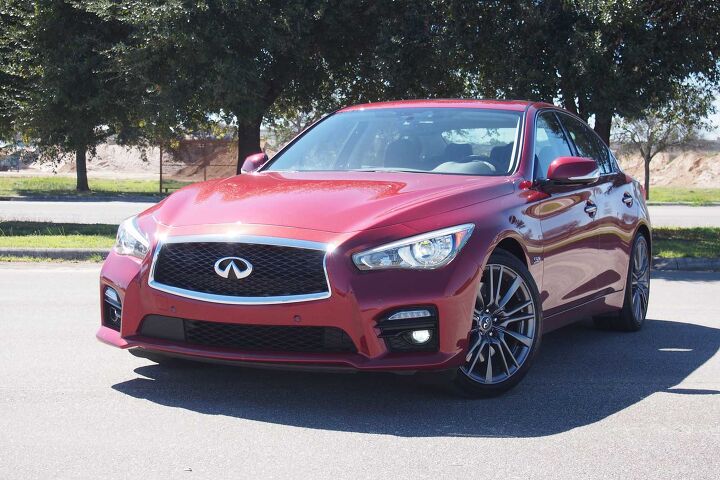
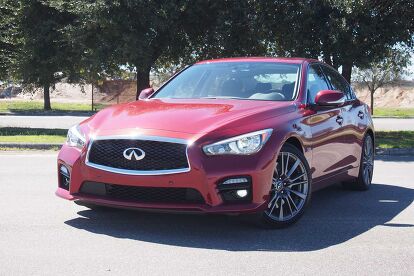





















































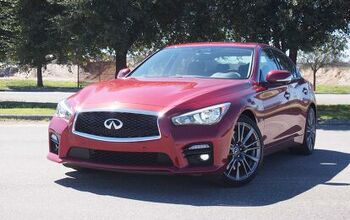



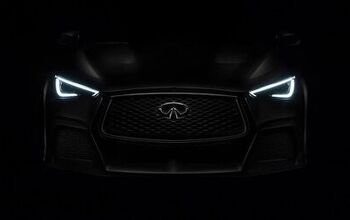

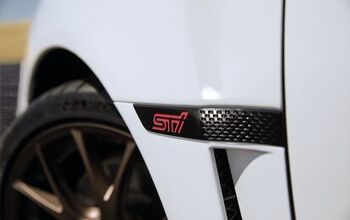




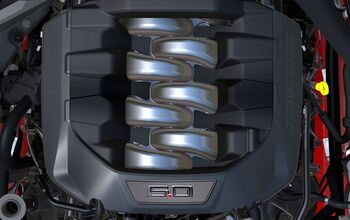

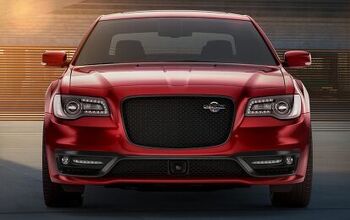

Comments
Join the conversation
Bummed. I agree this needs a sportier transmission and a real engine note. Infiniti goes through periods of greatness and confusion.... looks like we are bouncing out of the bottom of the confused stage. Hopefully Mercedes can lend Infiniti some dual clutch boxes.
DAS = dumb ass steering. Fool me once. Never again.